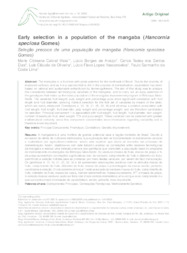Early selection in a population of the mangaba (Hancornia speciosa Gomes).
Early selection in a population of the mangaba (Hancornia speciosa Gomes).
Author(s): MAIA, M. C. C.; ARAUJO, L. B. de; DIAS, C. T. dos S.; OLIVEIRA, L. C. de; VASCONCELOS, L. F. L.; LIMA, P. S. da C.
Summary: The mangaba is a fruit tree with great potential for the northeast of Brazil. Due to the scarcity of improved cultivars, and as it is a species that is still in the process of domestication, exploitation has been based on rational and sustainable extractivism by farmer-gatherers. The aim of this study was to analyse the correlations between technological variables of the mangaba, and to carry out an early selection of the genotypes that make up the base population of the mangaba improvement program of Embrapa Meio-Norte. The variables fruit weight, pulp weight and percentage pulp show significant correlation with fruit length and fruit diameter, allowing indirect selection for the first set of variables by means of the latter, which are easily measured. Genotypes 4, 13, 16, 21, 25, 32, 35 and 49 show a positive association with fruit weight, fruit length, fruit diameter, pulp weight and percentage weight, and are therefore candidates for selection. Principal component 1 is associated with fruit weight, fruit length, fruit diameter, skin weight, number of seeds per fruit, seed weight, TTA and pulp weight. These variables can be selected with greater mathematical certainty, since this component concentrates more information regarding variability and is therefore more important.
Publication year: 2020
Types of publication: Journal article
Keywords: Características Agronômicas, Componente principal, Correlação fenotípica, Fitomejoramiento, Genetic improvement, Genetic selection, Genótipo, Hancornia Speciosa, Mangaba, Melhoramento Genético Vegetal, Phenotypic correlation, Principal component analysis, Principal componentes, Selección genetica, Seleção, Seleção Genótipa, Seleção precoce
Observation
Some of Embrapa's publications are published as ePub files. To read them, use or download one of the following free software options to your computer or mobile device. Android: Google Play Books; IOS: iBooks; Windows and Linux: Calibre.
Access other publications
Access the Agricultural Research Database (BDPA) to consult Embrapa's full library collection and records.
Visit Embrapa Bookstore to purchase books and other publications sold by Embrapa.

